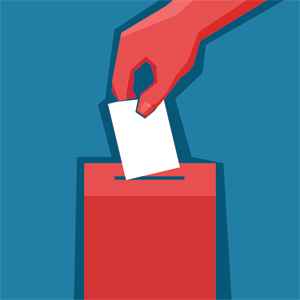Top state court reverses order that would've added fear of COVID-19 to absentee voting excuses

Image from Shutterstock.com.
The Tennessee Supreme Court on Wednesday vacated a ruling that would have allowed all registered voters concerned over COVID-19 to vote absentee in the November 2020 presidential election.
In the opinion, written by Justice Cornelia Clark, the court held that Davidson County Chancery Court Judge Ellen Hobbs Lyle made a mistake when she ruled in June that the state must add fear of contracting or spreading the virus as an excuse to vote absentee.
“We find that the state’s interests in the efficacy and integrity of the election process are sufficient to justify the moderate burden placed on the right to vote of those plaintiffs and persons who neither have special vulnerability to COVID-19 nor are caretakers for persons with special vulnerability to COVID-19,” the court said.
The Tennessean, CNN, USA Today and Courthouse News Service reported on the decision.
Two groups of voters filed lawsuits in May alleging that Tennessee’s absentee voting rules would prevent them from voting by mail during the COVID-19 pandemic. One of those voters, Benjamin Lay, is a cancer survivor who claimed that he shouldn’t have to choose between voting in-person and compromising his health.
The court said in its ruling that voters who are hospitalized, ill or physically disabled or who are the caretaker for those with underlying health conditions could already cast a ballot by mail.
The burden placed on citizens with “no special vulnerability to COVID-19” was characterized as moderate, the court said, since the state’s plan for in-person voting included several protective measures, including social distancing, installation of plexiglass shields at check-in tables, and mandatory masks and gloves for poll workers.
Hedy Weinberg, the executive director of American Civil Liberties Union of Tennessee, said in an Aug. 5 statement she was “troubled that the court did not expand the use of mail-in ballots, so that all Tennessee voters could decide how to best cast their ballot to protect their health and safety.”
“The COVID-19 pandemic is hitting Black communities and urban areas the hardest,” Weinberg said. “Failing to expand mail-in voting in the midst of the pandemic is nothing short of voter suppression.”
Courthouse News Service reported that with Lyle’s temporary injunction in place during the state’s Thursday primary election, more than 578,000 residents submitted absentee ballots or voted in the early voting period. This was a 105% increase from the 2016 election, according to data provided to the publication from the secretary of state.
The Tennessee Supreme Court said since it issued its opinion during the primary election, all absentee ballots submitted on time “shall be duly counted.”
Tennessee is one of only a few states that still require an excuse to vote absentee, according to the Tennessean.



